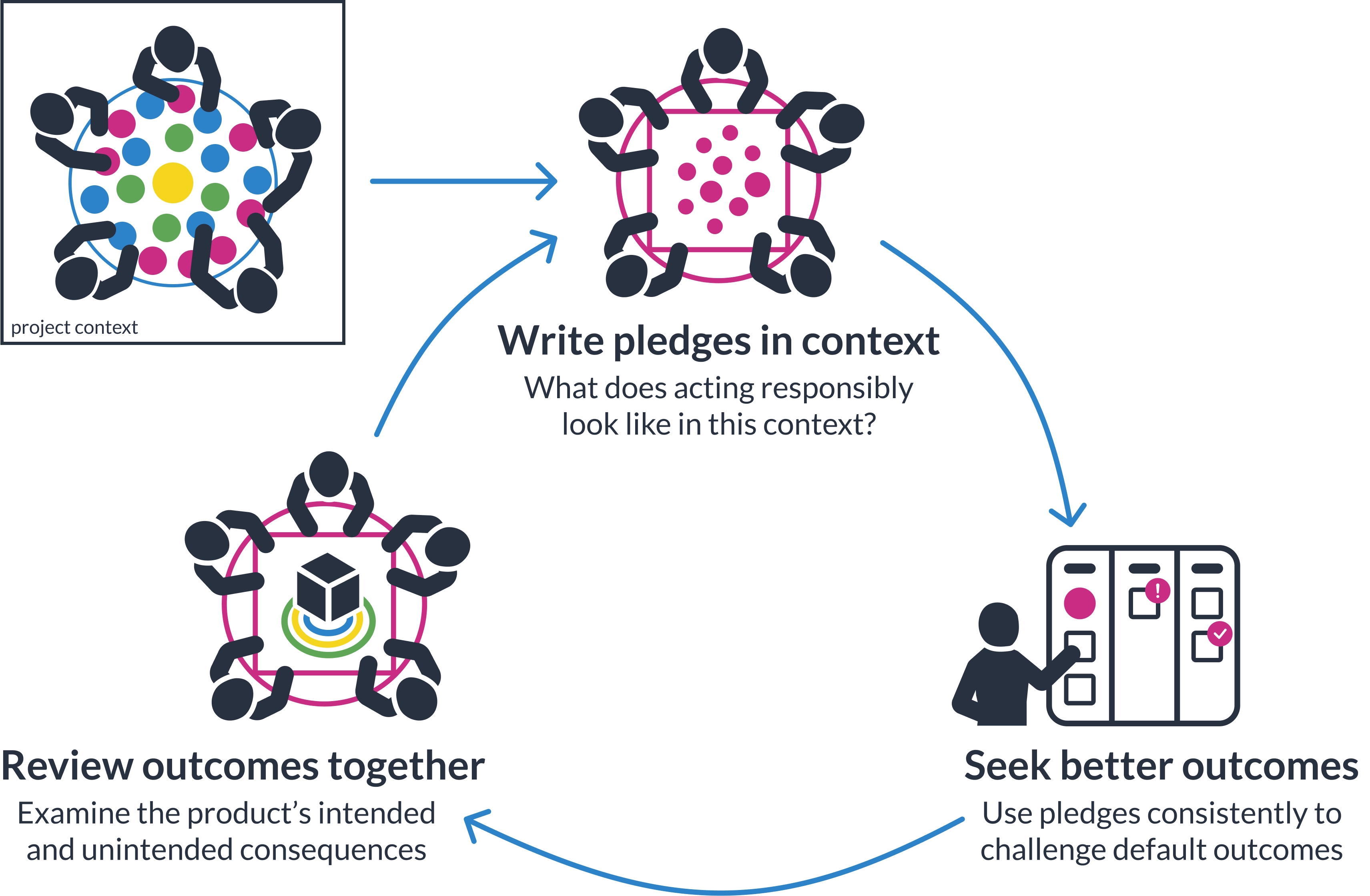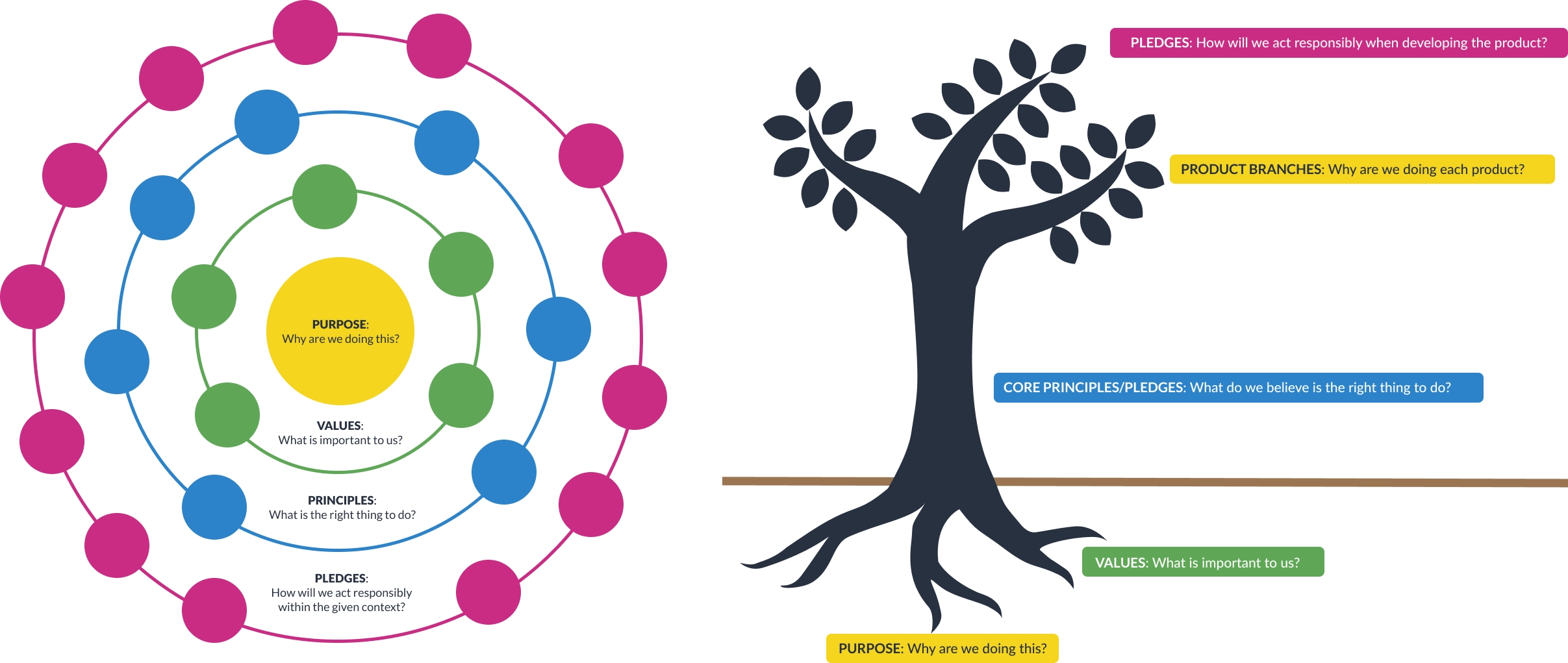There is a growing responsibility gap in the tech industry. Increasingly, tech workers are realizing moving fast and breaking things causes problems down the road. We want to work for companies that are a force for good in the world. While most tech companies profess values and principles that have us nodding in agreement, we’re collectively discovering it’s not always easy to apply the “Don’t be evil” principle in practice, especially when you’re under stress and there is pressure to meet deadlines amidst conflicting expectations.
Part of the problem is that values and principles often end up collecting dust as posters plastered around the office, while the everyday product decisions we make under pressure lead to actions that diverge from our good intentions and professed principles. Even Facebook Meta lists “Keep People Safe and Protect Privacy” among their key principles, and we’re all seeing how well that holds up under scrutiny.
Introducing Pledge Works
At ResponsibleTech.Work, we challenge product teams to discover how to act responsibly in their everyday product decisions with Pledge Works.
Pledge Works is a catalyst for responsible design and development. The core idea is simple: Pledge Works invites you to write pledges for better outcomes at every step of your existing processes, in cascading levels of granularity.

By writing pledges, you are making promises – commitments to yourself, your team, your customers, various stakeholders, and the planet – to seek better outcomes in context. Writing pledges as a team invites discussion as to whether your work reflects your core principles and values.
Pledges always match your scope of work. Pledges cascade from high-level company pledges to low-level pledges that target specific pieces of work, making it easy to keep track of what responsibility looks like at every level.
This is what it might look like in practice. As a team, you select this high-level pledge for your project: “We pledge to respect people we build products for and treat them as friends, not users.” When you break down your project into what needs to be implemented, you derive a more specific pledge and add it to your product backlog: “As a responsible team, we pledge to use simple and inclusive language in the UI because we want to make our tool accessible to non-native English speakers and easy to adopt in diverse teams.”
Unlike principles and values, pledges need to be visible and at hand to inform your work. On the implementation level, pledges become fully-fledged members of your backlog. Anyone on the team can challenge feature requests that break pledges the team has agreed upon – or celebrate features that uphold pledges.
Explore Pledge Works
To learn more about the building blocks of Pledge Works, including pledge types and formulas with examples, pledge checklists, and sources of pledges, visit the Pledge Works listing in our Tools directory. We also provide examples of how to implement Pledge Works in practice, regardless of which development process you might be using.

We developed Pledge Works to match our requirements for tools: it fits into existing processes, different stages of product development, can grow with your team, and invites you to have ethical discussions. You don’t have to use all the building blocks and we encourage adaptations and experimentation.
And if you want to dig deeper and experiment visually, there’s also Pledge Toolbox, a set of tools to help you write and examine your pledges from a broader ethical perspective.

Who is Pledge Works for?
By developing various types and formulas of pledges, we think Pledge Works could help:
- Companies and organizations that are ready to be held accountable for their actions and want to include their employees in the decision-making process.
- Product managers that want to ensure ethical concerns brought up by their team are not swept under the carpet and who want to bring diverse perspectives to the table.
- Developers, designers, and other members of product teams who see ethical issues with the product they’re working on but don’t feel like they have a say in the process. In other words, any product people who would like to change how things are done in their company but don’t have any real opportunities to influence priorities and high-level principles.
- Professions in other roles within companies and organisations (marketing, legal, HR, etc.) who are finding it hard to advocate for more ethical decision-making.
Looking for feedback on Pledge Works
We have seen the power of writing down concrete pledges in our own work and developed thought experiments for different contexts, but we want to test Pledge Works more widely in order to see what works and what doesn’t. We don’t want Pledge Works to end up as just another tool in a directory that nobody uses, so we think it’s crucial to validate it in different contexts.
We invite you to try out Pledge Works in your own projects and let us know how it works for you. You can start small by writing your own pledges and using them as a lens through which you challenge your daily tasks. Or give it a try as a team. You could also share your pledges and invite feedback from your customers or peers. Either way, we hope to hear from you on GitHub discussions. We’re happy to have a chat with you and your team on how Pledge Works might work for you.

 ResponsibleTech.Work team
ResponsibleTech.Work team